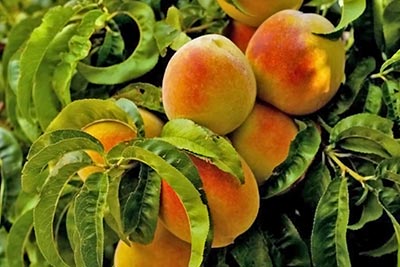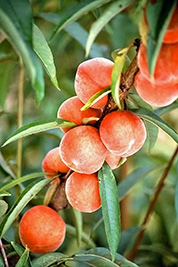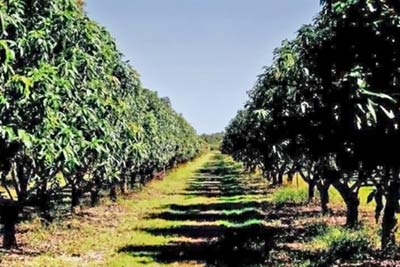FRUIT OF THE SPIRIT — Fruit of the Spirit — Part 1
El Fruto del Espíritu — Fruto del Espíritu — Parte 1
by
Mary Hunt Webb
Posted Tuesday, January 31, 2017

Even if the fruit were not present to indicate the type of tree it is, the leaves of the apricot tree are distinctive enough to distinguish it from other fruit trees. [Photographer: StockSnap. Photo courtesy of Stockvault.net.]
During my walks through our neighborhood, I became acquainted with the different types of leaves on trees. That meant that I was able to recognize the type of fruit that some of them produced even when there was no fruit on them. The leaves on an apricot tree, for example, are long, narrow, and curved. While the fruit may confuse some people who mistake them for peaches, the distinctive curve and ruffled surface of the apricot leaf distinguishes the apricot tree from the peach tree with its straight, smooth leaves.

The leaves on the peach tree are comparatively straight and not curved or ruffled like those of the apricot tree. [Photographer: Pixabay. Photo courtesy of Stockvault.net.]
Even with that indication from the leaves, it is still the fruit that sets the apricot tree apart from any other fruit tree.
In the same way that the presence of fruit indicates what kind of tree it is, a person's behavior indicates the control of sin or the presence of the Holy Spirit in that person's life. Romans 8:5 tells us that, "Those who live according to the sinful nature have their minds set on what that nature desires." (New International Version) In Galatians 5:19-21a, the Apostle Paul describes those desires: "19) The acts of the sinful nature are obvious: sexual immorality, impurity and debauchery; 20) idolatry and witchcraft; hatred, discord, jealousy, fits of rage, selfish ambition, dissensions, factions 21) and envy; drunkenness, orgies, and the like." (NIV)
This list is interesting because some are behaviors of self-destruction, some are acts against God, and some involve interaction with other people. Those that display such behaviors announce to the world that the Spirit of God is not in their lives. Romans 8:7 says that, "the sinful mind is hostile to God. It does not submit to God's law, nor can it do so." (NIV)
Although one may say one is a Christian, that person's actions will show that he is lying. Similarly, if a person has accepted Jesus as Lord and Savior so that the Spirit of God resides in him or her, then the presence of the Spirit will show up in the behavior of that person. That is the meaning of the phrase, "the fruit of the Spirit." The presence of God's Spirit in a person is as obvious as fruit on a tree.
Although each fruit tree displays only one kind of fruit, the "fruit of the Spirit" appears in nine forms. Galatians 5:22-23 lists them for us: "22) But the fruit of the Spirit is love, joy, peace, patience, kindness, goodness, faithfulness, 23) gentleness and self-control. Against such things there is no law." (NIV)
I believe that "love" is mentioned first because it is the quality that makes the others possible. Love is generally accepted as affection, tenderness or strong positive feeling based on kinship, personal ties, or mutual interests. While this is usually meant as feelings toward others, Romans 13:9 tells us, "The commandments, 'Do not commit adultery,' 'Do not murder,' 'Do not steal,' 'Do not covet,' and whatever other commandment there may be, are summed up in this one rule: 'Love your neighbor as yourself.'" (NIV) A person that does not love himself first cannot love others and is also incapable of demonstrating the other fruits of the Spirit.
With love in his heart, a person then has the ability to possess "joy", which can be defined as a sense of well-being and gladness. Following that, "peace" is an inner tranquility that shows up when we respond to the actions of others. A person that possesses peace does not get upset easily. Consequently, peace is an inner quality that extends to interaction with others.
When we have inner peace, then we are able to demonstrate patience and forbearance with others. That means that we don't become easily annoyed or disturbed in our dealings with other people. In being patient, we also demonstrate kindness and goodness, which can include generosity toward others.
The quality of faithfulness includes keeping our promises and persevering even when circumstances make consistency difficult. It is because the Spirit of God resides in us, that we are able to demonstrate gentleness and self-control when circumstances might dictate otherwise.
In short, it is the presence of the Spirit of God in our lives that produces the "fruit" as evidence that He is there and working in us. Fruit trees require work if they are to continue producing so that it is no surprise that God is always working in us to maintain the production of fruit. In that respect, a church is like an orchard with trees in various stages of cultivation. And, every orchard carries the expectation of a bountiful harvest.
BIBLE VERSES FOR THIS POSTING
Romans 8:5 — Those who live according to the sinful nature have their minds set on what that nature desires. (New International Version)
Romanos 8:5 — Porque los que son de la carne piensan en las cosas de la carne; pero los que son del Espíritu, en las cosas del Espíritu. (Reina-Valera 1960)
Galatians 5:19-21a — 19) The acts of the sinful nature are obvious: sexual immorality, impurity and debauchery; 20) idolatry and witchcraft; hatred, discord, jealousy, fits of rage, selfish ambition, dissensions, factions 21) and envy; drunkenness, orgies, and the like. (NIV)
Gálatas 5:19-21a — 19) Y manifiestas son las obras de la carne, que son: adulterio, fornicación, inmundicia, lascivia, 20) idolatría, hechicerías, enemistades, pleitos, celos, iras, contiendas, disencioines, herejías, 21) envidias, homicidios, borracheras, orgías, y cosas semejantes a estas. (RVR 1960)
Romans 8:7 — the sinful mind is hostile to God. It does not submit to God's law, nor can it do so. (NIV)
Romanos 8:7 — Por cuanto los designios de la carne son enemistad contra Dios; porque no se sujetan a la ley de Dios, ni tampoco pueden; (RVR 1960)
Galatians 5:22-23 — 22) But the fruit of the Spirit is love, joy, peace, patience, kindness, goodness, faithfulness, 23) gentleness and self-control. Against such things there is no law. (NIV)
Galatas 5:22-23 — Mas el fruto del Espíritu es amor, gozo, paz, paciencia, benignidad, bondad, fe, 23) mansedumbre, templanza; contra tales cosas no hay ley. (RVR 1960)
Romans 13:9 — The commandments, 'Do not commit adultery,' 'Do not murder,' 'Do not steal,' 'Do not covet,' and whatever other commandment there may be, are summed up in this one rule: 'Love your neighbor as yourself.' (NIV)
Romanos 13:9 — Porque: No adulterarás, no matarás, no hurtarás, no dirás falso testimonio, no codiciarás, y cualquier otro mandamiento, en esta sentencia se resume: Amarás a tu prójimo como a ti mismo. (RVR 1960)

The owners of this orchard can expect a bountiful harvest. [Photographer: Jesús Baez. Photo courtesy of Stockvault.net.]
